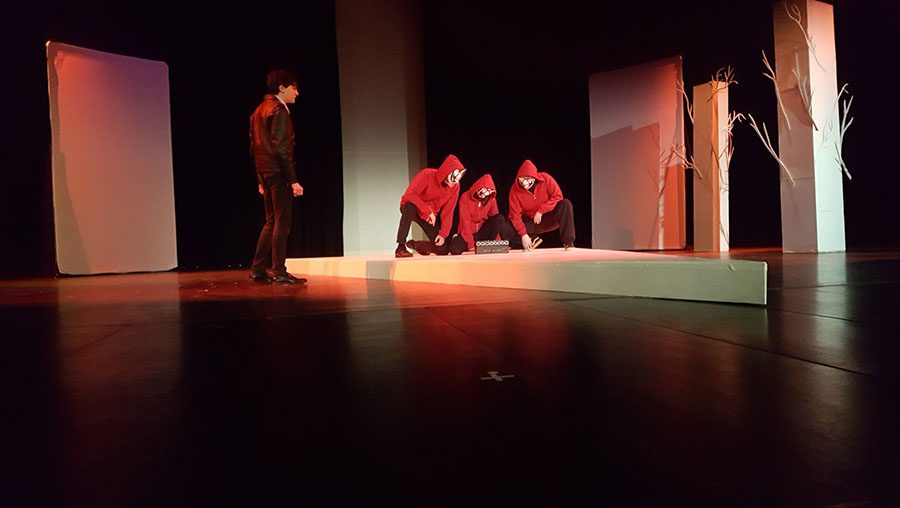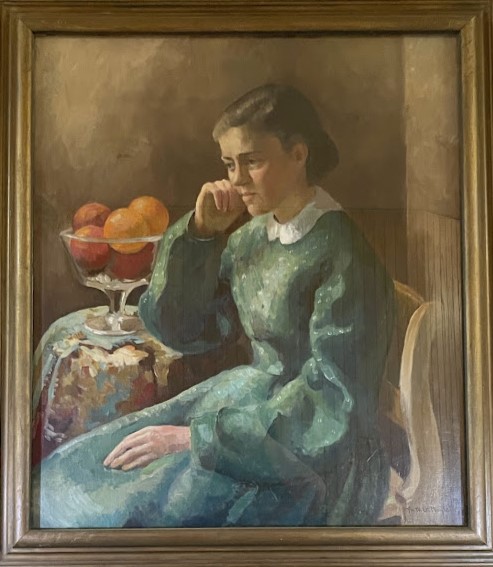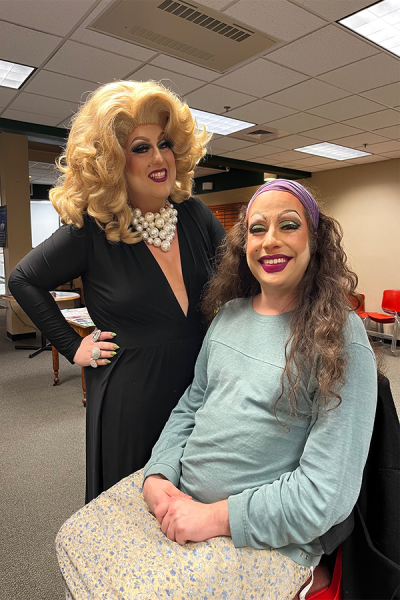Bloody, bold, and resolute
Macbeth and the three witches on the Dibden Stage
One of Shakespeare’s best known plays took the stage at Dibden Center for the Arts Feb. 14-17… “Macbeth” was directed by Laura Roald, who previously directed “Nine” also at Dibden.
This “Macbeth” is an adaption set in a future Scotland after the collapse of the European Union and the United Kingdom. Instead of armor, Macbeth dons a leather jacket into battle. The three witches, now dressed in red hoodies and masks, are summoned via cell phone.
“Macbeth” follows the titular character, played by Emmett Erwin, as he falls from loyal soldier and thane to the king to tyrant on a stolen throne. Macbeth and his friend Banquo (played by David Constantine) come across three witches (played by Katelyn Shaw, Kevin Diette, and Athena Abromowitz) after a battle. The witches hail the two, giving them a prophecy of great things to come. Macbeth is told he will become the Thane of Cawdor, then the King of Scotland. This causes a rippling effect spurred on by Macbeth’s ambition. He is given the title of Thane of Cawdor shortly after, which leads King Duncan (played by Kyle Palmer) to his manor in celebration. Here, Macbeth, spurred on by Lady Macbeth (played by Katelyn Shaw) kills King Duncan and frames the two guards and the king’s children for the murder. Both Lady Macbeth and Macbeth spiral from there, Macbeth continuing to kill those he perceives as threats while each death and murder weighs heavier on him until he snaps.
The acting was really strong. There were points where I had to force myself out of the show to take notes so that I could write this review, but I could barely maintain focus on that before being drawn back into the future of Scotland. Multiple times throughout the show, the grief characters felt actually made me tear up, particularly when MacDuff (played by Caleb Eugley) found out his wife and children were killed. The tragedy of the means that Macbeth chose to fulfill his ambition is emphasized time and time again as families are torn apart and murdered.
It wasn’t all just tragedy. The murder and the heartbreak were broken up by moments of comedy. The Porter, played by Kian Kaufman, had a scene to himself as he stumbled around drunk and told jokes about who was knocking at the house’s door. Another scene was between Lady MacDuff (played by Keirstan Lague) and her child (played by Verity Thompson) shortly after MacDuff left to find the rightful ruler of Scotland. These moments allowed the audience to breath in the sea of tragedy that welled up and were masterfully acted out.
The sound, designed by Jared Aldi, was incredible. In between scenes, a haunting beat that felt like blood pounding in the ears kept the audience tense as the sets were changed. The music, when there was some, never overshadowed the performance and heightened the emotional weight of the scenes.
The set and scene, designed by Kalob Gabree, was simple but effective. Three white pillars stood at the left right and center of the stage. A white triangle served as a smaller stage during scenes with larger groups of characters, a natural-feeling spotlight that still allowed the audience to notice the reactions of other characters, such as when King Duncan (played by Kyle Palmer) arrived with his assembly to Macbeth’s home and Fleance (played by James Mello) kept on trying to play on his handheld gaming device and being interrupted by his father, Banquo, while Macbeth greeted the king.
Costumes were designed by Alexandra Susco, and they were all great. It was an interesting meld of clothes that were more traditionally Scottish, such as what MacDuff was wearing, and modern clothes, such as Macbeth’s armor being a leather jacket or Duncan being dressed in a business suit.
t was easily the best showing of “Macbeth” I have ever seen. The show stayed true to the source material while making enough changes to still pique the interest of someone who wasn’t all that interested in Shakespeare.








